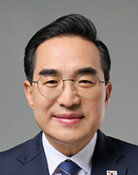Postponement of plural labor unions raised
Postponement of plural labor unions raised
Posted October. 26, 2000 20:43,
A proposal has been cautiously raised on shelving the plan to permit plural labor unions at a workplace from 2002 for about three years.
The suggestion is expected to stir up disputes as it damages the principle of expanding autonomous labor union activities.
According to the Tripartite Commission of the government, management and labor Thursday, a proposal to delay permission for plural labor unions to 2005 has been raised by some officials and employers.
They predicted that the question will become one of the major bones of contention between management and labor at the end of the year.
Plural unions at a workplace were legally allowed in 1997, when labor-related laws were revised. The revisions deleted a provision stipulating that a separate union would not be approved if its conditions for membership were the same as the existing one or were aimed at obstructing the normal operation of the existing union.
However, the Labor Union Law provides in its additional clause No. 5 that the permission of plural unions shall be deferred by Dec. 31, 2001 if a labor union is organized at a company or a workplace, allowing the establishment of plural unions from 2002.
At the time, the government positively promoted allowing plural unions from a viewpoint of complying with the international standards of ensuring the freedom of association. However, as the implementation of the new system is about one year away, some officials and employers are claiming that the plural unions will be burdensome to both labor and management.
The standing committee and labor-management relation subcommittee of the tripartite commission are discussing ways to simplify the negotiation channel following the permission of plural unions. However, formulating a plan to simplify the channel is difficult due to the varying conditions at each workplace.
The labor circle seems to be reluctant to make this question an open issue against its real intentions due to the moral obligation to extend basic labor rights.
Lee Chong-Sik, chief of cooperation headquarters at the Korean Federation of Trade Unions, said that labor union leaders of most workplaces appear negative toward plural unions and the position of employers would be the same.
He observed that there is a possibility that the business circle may suggest the plan to defer the implementation of the new formula.
Sohn Nak-Ku, chief of the office of advertisement and education of the Korean Confederation of Trade Unions, opposed the postponement of the system, noting that the confederation¡¯s basic position is that it should be enforced as scheduled, even though plural unions will not be always helpful to existing ones and employers may found kept unions if they choose to do so.
Jung Young-Gwan yongari@donga.com




![[단독]“거부도 못해” 요양병원 ‘콧줄 환자’ 8만명](https://dimg.donga.com/c/138/175/90/1/wps/NEWS/IMAGE/2026/03/02/133450041.2.jpg)


